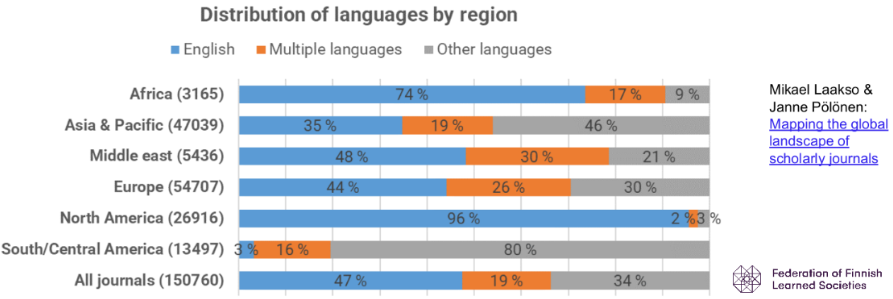Each quarter, DORA holds a Community of Practice (CoP) meeting for National and International Initiatives working to address responsible research assessment reform. This CoP is a space for initiatives to learn from each other, make connections with like-minded organizations, and collaborate on projects or topics of common interest. Meeting agendas are shaped by participants. If you lead an initiative, coalition, or organization working to improve research assessment and are interested in joining the group, please find more information here.
During the DORA National & International Initiatives CoP Discussion Group meeting on November 14, 2023, members of the group and DORA staff members met to discuss changes in research policy happening at each of their respective organizations. The group heard a presentation from Janne Pölönen, Secretary General of the Federation of Finnish Learned Societies, on multilingualism and language biases in research assessment.
Pölönen discussed the efforts of the Coalition for Advancing Research Assessment (CoARA) working group on multilingualism and language biases, highlighting their mission to raise awareness and provide guidelines for recognizing and rewarding science in all languages. Pölönen first outlined the importance of recognizing research in all languages, noting the challenges many non-English speaking scientists face when they publish papers in their native languages. English-language journals and universities are often used as the standard or default for the scholarly community, putting pressure on researchers to translate their work and try to publish in English journals. As a result, publications are largely skewed towards English, leaving non-English publications less cited. Non-English publications may also be passed over due to search engines ignoring special characteristics of other languages, subsequently omitting information or meaning.
Although a large majority of indexed publications are in English (upwards of 90%), preliminary data from the Federation Finnish Learned Societies demonstrates that, of 152,644 journals included in a global analysis, 53% are multilingual or in languages other than English. This suggests that multilingualism in publications is more established than once thought. The issue then becomes accessibility. While there may be lots of local-language publications, if they are not indexed in major databases, they essentially become “invisible” to evaluators and their impact is not recognized. The CoARA working group aims to address these challenges by raising awareness about multilingualism in science, addressing language biases in metrics, expert-assessment and rankings, and providing institutions with guidelines and tools to implement equitable recognition and incentivization for research in all languages.

In addition to his role with the CoARA working group, Pölönen is on the management committee of the Helsinki Initiative on Multilingualism in Scholarly Communication, of which the Federation of Finnish Learned Societies is a founding signatory. Created in 2019, the Helsinki Initiative works to address the challenges faced by non-English speaking scientists around the world. The Helsinki Initiative provides recommendations for promoting language diversity in research assessment, evaluation, and funding systems: “Make sure that in the process of expert-based evaluation, high quality research is valued regardless of the publishing language or publication channel.” Pölönen stressed the importance of ensuring the availability of high quality research in all languages. The dissemination of research beyond academia and the promotion of interacting with heritage, culture, and society are crucial components of the Helinski Initiative.
Pölönen’s presentation was followed by a group discussion that touched on a range of key issues related to supporting multilingualism in publishing and scholarly communications. For example, small journals that serve local communities often encounter difficulty being visible to the scientific community beyond the local one in which they serve. While publishing locally serves the community and can prevent the loss of geographically and culturally important elements, journals of this nature face difficulties being accessible to a broader audience and the discrepancies are very large across multiple disciplines.
Both Pölönen and DORA promote the recognition of research across all disciplines and cultures, valuing openness and transparency. In his presentation, Pölönen discussed the importance of these values and emphasized the importance of equitable and inclusive scholarly communication. Promoting multilingualism in research can help to ensure scientists from around the world not only have access to knowledge and research, but also the ability to share results in their native language.
Suggested Reading List
Multilingual publishing in the social sciences and humanities: A seven-country European study
Helsinki Initiative on Multilingualism in Scholarly Communication
Multilingual publishing across fields of science: analysis of data from Finland and Poland
Mapping the global landscape of journals
Who are the users of national open access journals? The case of the Finnish Journal.fi platform
A longitudinal analysis of university rankings
The manifold costs of being a non-native English speaker in science
Using Narrative CVs: Process Optimization and bias mitigation
Multilingualism of social sciences
Casey Donahoe is DORA’s Policy Associate

